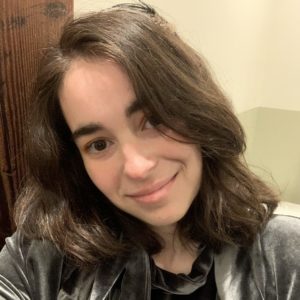As a child, Leslie T. Grover loved to write stories — and loved convincing her younger brother to act them out with her even more. “He was three, and he was the lead in my soap opera about doctors,” she says.
Today, as a fiction writer and the managing editor at PushBlack, she writes and shares stories about the history and experiences of the African diaspora. Leslie’s taken a winding path back to her creative roots, from earning a Ph.D in public policy and teaching for many years, to opting to leave academia behind to pursue her true passion – storytelling. “All my life, there’s been this art, writing, creative side and this very public policy, social policy, equality, equity side,” she says.
As a storyteller, Leslie understands her power to change lives. “Stories help us survive,” Leslie says. “Stories are the root of all of our ways of being and seeing in the world.”
They can also inspire us to make big changes in our personal lives, at work and in our communities, and that’s why we’ve invited Leslie to join us as the keynote presenter at Managing Editor Live 2022. Ahead of that talk, we spoke to Leslie about how storytelling can inspire us to take action in support of positive change.
Stories Permeate Every Aspect of Our Lives
We all grew up hearing stories: bedtime stories with clear heroes and villains, family stories passed down by relatives, the tales we heard at school or out in the world. The very foundations of who we are is informed by stories.
The narratives we hear — and tell ourselves — help us find perspective in a chaotic world. They can also help us prioritize what’s important.
“If there’s something you want to change, a good habit you want to take on or a bad one you want to stop,” Leslie says, “there are stories that we tell ourselves about ourselves that can inhibit that or that can make that happen.”
Doing the Quiet Work
Stories inspire us on an individual level, but they also work to drive change on a societal level. Leslie’s been immersed in social justice for as long as she can remember, and storytelling has always been a big part of her vision. “My goal was to create documentaries and write stories that made people stop hating each other,” she says.
Social justice is part of Leslie’s heritage. Growing up in the Mississippi delta, Leslie heard stories from her parents about how they pushed social boundaries. “My parents were the first Black people to integrate their respective jobs,” she says. Her father did graduate work at the University of Mississippi, and was even friends with James Meredith, who made history as the first Black person admitted to the university’s undergrad program. “My dad wasn’t a civil rights leader in that type of way, but he was doing the quiet work,” Leslie says.
Inspired by her parents’ example, Leslie pursued public policy work herself. But after teaching for many years, she decided to bring the two sides of her personal story together and applied to work at PushBlack. “All the skill sets that I have built — writer, social policy, community work, college professor, teaching people, research — has all come full circle, because that’s exactly the job that I do in being a managing editor at PushBlack,” she says.
And as a managing editor, Leslie has discovered her power in bringing people together around shared stories. “When we come together, we can demand change through storytelling,” Leslie says, “demand voices and space for stories that are so often unheard or marginalized.”
The Power of Stories Is in Perspective
The stories that PushBlack highlights convey historical information, but they also reframe how readers understand history, culture and politics.
“At PushBlack, what we do is tell stories,” Leslie says. “We tell stories around Black history and Black identity, and we’re filling a void that probably is not going to be filled by anything other than PushBlack for ages to come.”
Exploring Black history and experiences through the lens of stories provides an easy entry point into understanding the chaos of the world around us. PushBlack’s perspective is an anchor for better understanding the Black lived experience through sharing history.
“It roots our stories in a way that not many organizations can do the way we can,” Leslie says, “because we’re intentional about the strategy, the stories, the writers and how we wield that information to inspire and inform.”
Empathy requires us to be willing to understand each other, first, before we can comprehend the moments in history that have shaped where we are today. “The privilege of working in a field in an organization that deals with storytelling is the privilege of learning more about myself and the readers — to learn more about each other,” Leslie says.
And that knowledge is power: Fundamentally, when readers gain a greater understanding of Black history in the context of lived experiences, they participate in that history and shape stories for generations to come.






